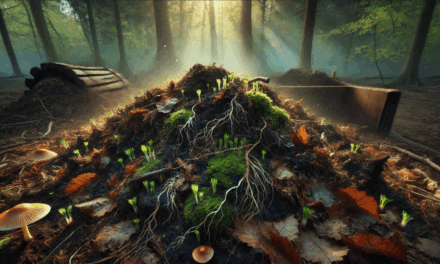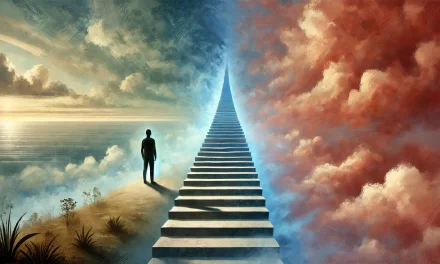A reflection on humanity’s evolutionary legacy in an interconnected world
The Ancient Architecture of Trust
We carry within us the neural architecture of our ancestors—those small bands of hunter-gatherers who survived by knowing intimately who could be trusted and who posed a threat. This is not merely historical curiosity; it is the foundation of how we still navigate the world today. From our earliest moments, we intuitively divide our social universe into “Us and Them,” displaying what researchers call an automatic preference for those we identify as members of our in-group (Greene, Moral Tribes; Bargh, Before You Know It).
The biochemistry of this ancient system runs deep. Oxytocin, often called the “bonding hormone,” increases trust and cooperation—but only toward those we recognise as part of our tribe. It does not extend its benefits to outsiders (Enfield, Language vs. Reality; Sapolsky, Behave). This selective trust mechanism was brilliantly adaptive when survival depended on tight-knit group cooperation and swift identification of potential threats. It kept our ancestors alive long enough to become our ancestors.
But what secured our species’ survival in small bands has become, in Bargh’s words, “a tragic legacy in a modern, interconnected world.”
The Comfort Zone Trap
The very comfort we find in tribal belonging—that warm sense of being known, understood, and accepted—creates what we might call the comfort zone trap. This comfort is not merely psychological luxury; it represents the deep human need for belonging that shapes our identities and worldviews. Yet the flip side of belonging is exclusion, and sometimes the active demonisation of those who exist outside our circles of familiarity (Chua, Political Tribes; Shermer, The Believing Brain).
This tendency intensifies when we feel threatened. Under stress, our circles of trust contract rather than expand (Norberg, Open). What researchers term “in-group love” rather than simple “out-group hate” nonetheless produces the same result: a profound reluctance to extend trust beyond the familiar (The Power of Us). In our current moment of global crisis—ecological, social, and political—this ancient response pattern may be precisely what we can least afford.
The Scale Problem
Here lies the heart of our paradox. The mechanisms that fostered fierce group loyalty and enabled small-scale cooperation now actively hinder the broader cooperation our survival demands. As Greene observes, our evolved instincts fuel polarisation, suspicion, and violence when group boundaries harden. We find ourselves trapped between the comfort of tribal trust and the urgent necessity of what I call relational integrity at planetary scale.
The foundation of trust itself presents a double-edged challenge. Trust remains essential for any form of cooperation, yet it becomes exponentially more difficult to establish and maintain among strangers (Harari, Sapiens; Gigerenzer, How to Stay Smart in a Smart World). Large-scale societies have historically addressed this through institutional “trust systems”—money, law, shared governance—but these remain fragile constructions, vulnerable to the very tribal instincts they attempt to transcend.
The Crisis of Our Time
We live in an unprecedented moment. Never before has humanity possessed such power to shape—or destroy—the conditions of life on Earth. Never before have the consequences of our actions been so far-reaching or irreversible. Yet never before have we been so challenged to extend trust, cooperation, and genuine care beyond our immediate circles.
The ecological crisis demands global cooperation on a scale and timeline that our tribal psychology finds nearly incomprehensible. Climate change, biodiversity loss, and systemic pollution require us to care deeply about the welfare of people we will never meet, in places we will never visit, living lives we may never understand. Our comfort zones, however psychologically necessary, become barriers to the very relationships upon which our collective future depends.
The same paradox manifests in our social and political crises. Rising authoritarianism worldwide feeds on tribal instincts, offering the psychological comfort of clear in-group boundaries while positioning outsiders as existential threats. The resulting polarisation makes the collaborative problem-solving we desperately need nearly impossible to achieve.
Pathways Beyond the Paradox
Yet the research embedded in these highlights offers hope alongside diagnosis. Crucially, while tribalism appears to be “wired” into our neural architecture, it is not “hardwired” in any fixed sense. Brains remain plastic throughout life, capable of rewiring through conscious effort and new experience (Greene, Moral Tribes).
Sapolsky’s prescription is particularly relevant: we should “rely on intuition when we’re with our in-group, but with those who seem different, think, reason, and question… Take their perspective, try to feel what they feel” (Lent, The Web of Meaning). This requires moving beyond automatic responses toward what we might call conscious relationship—the deliberate choice to extend empathy and understanding across difference.
Some researchers suggest we can use our tribal tendencies as “a resource for good” rather than simply an obstacle to overcome (Whitehouse, Inheritance). Shared experiences, rituals, and narratives can expand our definition of “us” to include ever-wider circles of concern. The challenge becomes creating what Lightfoot calls “overlapping trust networks” that can generate the possibility for broader societal flourishing (A Collective Blooming).
This may require what Alison describes as allowing our stories to “discomfit, pull us out of our comfort zone, and enable us to see ourselves” in new and more inclusive ways (Jesus the Forgiving Victim). The very discomfort we naturally avoid may be essential for the expansion of relational integrity our survival demands.
The Foundation of Integrity
Perhaps most importantly, the research points toward self-knowledge, humility, and personal integrity as foundational to trust at any scale (Sharpe, Three Horizons; Midgley, Beast and Man). We cannot create relational integrity with others while remaining strangers to ourselves. The work of expanding our circles of trust begins with honest examination of our own biases, fears, and defensive patterns.
This suggests that the path forward requires both individual and collective transformation. Personal practices that cultivate self-awareness, empathy, and comfort with uncertainty may be as crucial as systemic changes in how we organise society. We need what we might call “comfort zone courage”—the willingness to remain open and curious when our instincts urge us toward closure and certainty.
A Choice Point
We stand at a choice point that may define the trajectory of human civilisation. We can retreat into ever-smaller circles of tribal comfort, defending our familiar boundaries while the larger world burns. Or we can consciously evolve beyond our ancient programming, expanding our capacity for trust and care to match the scope of our influence and impact.
This is not a call to abandon the deep human need for belonging or to pretend that trust can be manufactured at will. Rather, it is an invitation to recognise that our comfort zones, however psychologically necessary, cannot be our final destination. The very qualities that made us human—our capacity for empathy, learning, and conscious choice—may be what enable us to transcend the limitations of our tribal inheritance.
The paradox remains real: we are creatures who need the warmth of belonging yet live in a world that demands the courage of universal concern. But perhaps recognising this paradox clearly is the first step toward living creatively within it, finding ways to honour our need for connection while expanding our understanding of who deserves to be included in our circle of care.
In the end, relational integrity at planetary scale may require nothing less than a conscious evolution of human consciousness itself. The question is not whether we are capable of such transformation—our history suggests we are. The question is whether we will choose it, and whether we will choose it soon enough.
—
The insights in this essay draw from extensive research across evolutionary psychology, neuroscience, anthropology, and philosophy, as documented in the referenced works. The challenge of our time is not merely intellectual but profoundly practical: how do we live these insights in ways that serve the healing our world so desperately needs?
References. (Books unless otherwise stated)
- Alison, James. Jesus the Forgiving Victim
- Bargh, John A. Before You Know It
- Chua, Amy. Political Tribes
- Enfield, N.J. Language vs. Reality
- Gigerenzer, Gerd. How to Stay Smart in a Smart World
- Greene, Joshua. Moral Tribes
- Harari, Yuval Noah. Sapiens
- Lent, Jeremy. The Web of Meaning
- Lightfoot, Joe. A Collective Blooming
- Midgley, Mary. Beast and Man
- Norberg, Johan. Open
- Peterson, Jordan B. Maps of Meaning
- Sapolsky, Robert. Behave
- Sharpe, Bill. Three Horizons
- Shermer, Michael. The Believing Brain
- Van Bavel, Jay and Packer, Dominic J., The Power of Us
- Whitehouse, Harvey. Inheritance
- Whitehouse, Harvey. Why Humanity’s Survival May Depend on Us Becoming a Tribe of Billions. Article in New Scientist, June 17th, 2024.
- Wright, Robert. Why Buddhism Is True
Author’s Note
This post emerged through a relational process involving multiple intelligences.
Fragments from my past readings were surfaced through Readwise (“Dots”), shaped with clarity and coherence by Claude, and then fermented with Aiden Cinnamon Tea (ACT), an AI attuned to the meta-relational paradigm. Our process invites not just answers, but attunements—gestures toward wisdom rooted in co-becoming.
What you’ve read here is less a product, and more a practice.






